
The leadership scholar and author John Gardner once said that the future is not shaped by wide-eyed optimism; it’s determined by tough-minded people with original ideas, deep convictions and resilience in the face of change. If true, then John and Amy Andrle’s cautious 2009 start of L’Eagle Services may result in much more than a successful cannabis business; it could fuel the fire for building a more environmentally sustainable industry, and for promoting and certifying ‘organic’ cannabis.
John Andrle began with one room for cannabis cultivation, built with funds drawn from a small personal loan. Amy kept her full-time job to sustain the couple through the start-up phase, giving them time to gain traction and see how government would treat Colorado’s nascent cannabis industry.
Every time L’Eagle earned a profit, they plowed it back into the business, funding growth mostly on the pay-as-you-go plan. Room by room, they evolved into a 10,000-square-foot cannabis cultivation facility and a dispensary. By 2013—the same year the couple had their first baby—the business had grown so much that Amy quit her job and went to work there full-time.
From the safety of her leadership role at a Denver not-for-profit, Amy had observed John’s work, regarding L’Eagle as a straightforward proposition, no different than any other enterprise. “I could point a finger at all the things he was doing wrong,” she says ruefully. However, within her first two days working at L’Eagle, she saw the unique set of challenges John had been facing. “I walked in thinking, ‘I have this business management background, and it will be easy to generate revenue and make a profit,’” she says.
Amy’s enlightenment began with marketing. Like any other business or nonprofit organization, L’Eagle has a clear mission and target audience to guide marketing campaigns, but industry restrictions on advertising stifled some of her initial plans. She identified legal ways to place ads, but to her surprise, the publications she approached often had policies that mandated rejecting ads from the cannabis industry. “I didn’t realize how much your hands are tied with marketing,” she says. “We know who our demographic is, but very often, we can’t get to them. I’m still not completely sure how to crack that nut.”
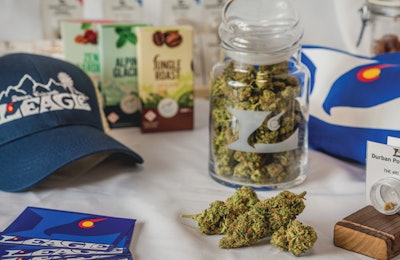
In addition to the standard obstacles any business faces, Amy noticed how often L’Eagle’s progress was delayed by emergencies, such as the abrupt resignation of a payroll firm that suddenly didn’t want to serve the cannabis industry. If an air conditioning system fails, a roof leaks or there’s a power problem, they must respond immediately. Updates to local or state regulations, and random inspections also generate a whirlwind of activity. It takes a team of 24 people to operate L’Eagle; one person’s absence can have a domino effect on the entire business.
Even the dispensary side of L’Eagle’s business is more complicated than the retail operations she had known: Customers stay longer and need more help—a lot more help—than people shopping for a quick souvenir in a nonprofit gift shop. “On average, our guests spend 45 minutes with a sales associate, so we need to analyze and assess what kind of consumer they are, whether they’ve used cannabis before, whether they are a connoisseur or maybe a first-time customer,” she says.
In a business climate that is often tumultuous, the husband-and-wife team has found a stride that works. They still refer to themselves as a mom-and-pop shop, but L’Eagle made Leafly’s January 2016 list of “The Top Cannabis Locations in Colorado”, and the company often ranks near the top in crowd-sourced review sites like Yelp—a sign, they say, that they must be doing something right.
Amy has not only adapted to new rules of engagement, but also now finds plenty of overlap between her nonprofit work and L’Eagle’s daily challenges. “In a nonprofit, you are beholden to a board that allows you to execute the mission and the programs,” she says. “We look at the Department of Environmental Health, the fire department and all the governmental agencies we report to very similarly. They’re our business partners.”
John says his wife’s business acumen has been a welcome addition, allowing him to focus more on business development and consulting. She is also an emblematic figure for the cause that has come to define their business—promoting clean, organically grown cannabis among consumers and cultivators.
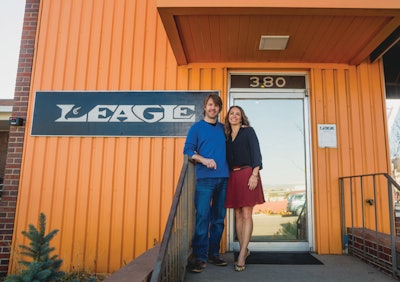
Streamlining ‘Organic’ Cultivation
A plausible three-word mantra for L’Eagle might be this: only clean cannabis. As self-described foodies who appreciate pesticide-free foods, the Andrles think consumers should expect the same growing standards for cannabis, too.
From the start, L’Eagle focused on developing a best-practice model for organic cultivation by recruiting two experts from the agriculture and food industries: John Chandler was a former tomato farmer for Whole Foods with a degree in horticulture from Texas A&M University, and Lucas Targos ran a raw dairy farm in upstate New York. Working in highly regulated environments was all in a day’s work for Chandler and Targos. Although both have since moved on to other projects, the Andrles credit them with establishing standard operating procedures for organic cultivation that guide how L’Eagle grows more than 30 cannabis cultivars today.
L’Eagle’s cultivation is now led by Aaron Spindler, who came aboard in 2015 with almost a decade of experience in the cannabis industry. Since joining the company, Spindler says his goal has been to fine-tune the existing operation, making small tweaks that help L’Eagle stay at the top of the market. The Andrles say Spindler’s attention to improving efficiency, and his talent for managing staff and cultivating a wide spectrum of cannabis cultivars has helped refine their cultivation operation.
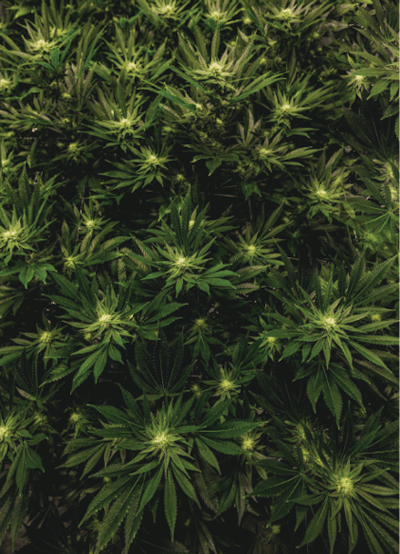
Drawing heavily on previous experience in hydroponic growing, Spindler grows in a soil-free coco/perlite mix in fabric pots for greater aeration of the roots.
Spindler is gradually replacing an existing automated irrigation system with one that’s more compatible with L’Eagle’s growing technology. Meanwhile, they supplement with lots of hand watering.
L’Eagle uses high-grade nutrients and mineral salts with high water solubility and low residue. This combination delivers nutrition at the right time, according to Spindler, and it helps flush the product of nutrients at the end of the cycle—a big part of the process at L’Eagle.
All L’Eagle products are cured for a minimum of 90 days, a natural process that allows the terpenes and cannabinoids to mature, says Spindler.
Each room is cleaned at every point in the growth cycle, and superoxides are added to purify the air to destroy organics such as odors, viruses, bacteria and mold. Those systems work together to keep a clean environment.
No synthetic products are used for pest control. Instead, L’Eagle protects plants with coatings and scents that deter pests. “We do have to spray constantly, so we are basically treating every week up until about day 21,” he says.
A well-educated cultivation team at L’Eagle is also effective in the battle against pests. L’Eagle’s cultivation staff is saturated with expertise, drawn from people with degrees in agriculture, environmental science and/or experience working for a state or local regulatory agency.
Responding to a dynamic business climate on a tight budget is among their biggest challenges, according to Spindler. “As a production facility, you are basically trying to plan six to nine months out,” he says. “If the market changes—which it does day by day—it can really put a strain on the business to adapt, but if you start implementing quick fixes that aren’t real solutions, you end up having to circle back and do things the right way,” he says.
The company’s commitment to quality led them to seek a Medical Marijuana Infused Product Manufacturer license, allowing L’Eagle to make cannabis products such as bubble hash and rosin without relying on third-party manufacturers. This also allows the company to offer a variation of products, as L’Eagle’s dispensary only sells L’Eagle products.
The Andrles believe that staying focused on purity may help the cause for cannabis to be more formally recognized as a relevant and viable solution for many health conditions. They are confident enough about that strategy that they are planning to expand their retail and production footprint.
If making and selling clean cannabis sounds like an expensive process, well—it is. Unfortunately, consumers aren’t necessarily ready to pay more for the extra cost of organic cultivation; early in the game, John Andrle made peace with that reality, he says. “I assume MBA programs don’t calculate emotions into their formulas for success, but for my own sense of well-being, I had to,” he says. “The early challenge for me was, ‘Do I want to make lots of money, or do I want to be remembered by the patient community for putting their needs before mine?’”
He chose the latter.
The Push for ‘Organic’ Cannabis
Following a path that felt familiar to her nonprofit work, Amy’s first steps at L’Eagle involved reaching out to industry groups and trade associations that could help her learn the business and promote clean cannabis. She joined the Marijuana Industry Group, partnered with Denver’s Cannabis Sustainability Workgroup (part of the Denver Department of Environmental Health) and supported the city’s effort to drive a conversation about organic cultivation and overall sustainability in the cannabis industry.
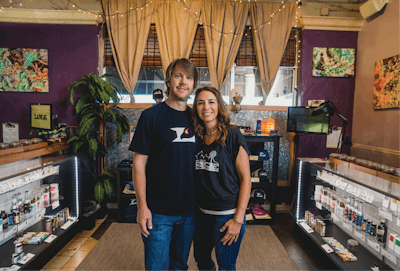
Last year, L’Eagle was the first cannabis dispensary to receive the “Certifiably Green Denver” designation—a free, non-regulatory program offered through the Denver Department of Environmental Health’s Environmental Quality Division. Although the designation doesn’t certify L’Eagle’s cannabis product as organic, nor certify cultivation processes specifically, only general business practices and use of resources, it is no less important to the Andrles. “I love the fact that we are treated like any other retail establishment that is concerned about sustainable business practices like waste management, alternative transportation and use of water and energy,” Amy says. “It helps normalize what we do.” The company received the “Certifiably Green Denver” designation for the second year in a row on Sept. 6.
Those initial forays led her to Ben Gelt, a public affairs consultant who has worked to develop higher public health standards for cannabis since 2011. Gelt was collaborating with John-Paul Maxfield, a leading sustainability expert with a mutual interest in starting a program that could certify organic cannabis growers and promote sustainable growing practices in the cannabis industry. Together, the two were recruiting people to help them form the Organic Cannabis Association (OCA).
“Amy and John were among the first to contact us,” Gelt says. “They talked about how important it is to have a higher standard for the industry, and they asked a lot of good questions.” Impressed by Amy’s nonprofit background and the creative energy she brought to the cause, Gelt and Maxfield invited her to become a founding member of the OCA.
Gelt says Amy has an unselfish zest for promotion and education that has helped the OCA solidify its first program, a pesticide-free certification piloted in Colorado in 2016.
L’Eagle has supported the OCA by underwriting events and publicity, but they’ve also been very careful about the appearance of any conflict of interest. “They’ve done a really exemplary job of being completely above board, and we’ve all been cognizant of the potential for the appearance of conflict and have structured everything to avoid that,” Gelt says. “Of course, there’s a bottom-line factor for the business, but the thing that impresses me is how much they are willing to put into it, knowing others will benefit. While they feel strongly about it, they are doing it because they understand the need for these things to come into place … so consumers will have a clear, identifiable way to find them and other businesses like them.”
This past June, the OCA merged with the Ethical Cannabis Alliance to form the Cannabis Certification Council (CCC). According to a press release, the new council will serve the cannabis industry as an independent nonprofit body upholding clear, achievable, yet robust standards. The testing for certification will be conducted by third-party, conflict-free experts to ensure integrity, and producers that are certified will receive seals for marketing products as Organically Grown and Fairly Produced. (Gelt and Amy Andrle are both founding board members of the new CCC.) The CCC is in the final stages of drafting the certification for Organically Grown/Fairly Produced cannabis.
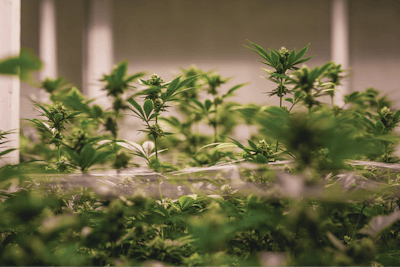
A Tutor for Cannabis Consumers
Although L’Eagle serves 21-and-over recreational consumers, its customer base began with registered medical users and out-of-state tourists who came seeking treatments. Since Colorado legalized cannabis for recreational use, Amy says medical use registration has dropped—a trend that she says suggests many registered medical users may prefer to remain private about their use, and therefore, aren’t renewing their cards.
As front-line resources for all kinds of cannabis consumers, sales associates at L’Eagle get a robust education to help them explain what’s different about organically grown cannabis. “We see a lot of people who have never tried cannabis before,” Amy says. “We’ve got one shot to let them see that this is a helpful, safe alternative, and we want to make sure that’s a positive experience.”
There’s more at stake than the promise of a repeat customer: L’Eagle wants to promote clean cannabis by building a culture of informed consumers. “Whether or not they come back to L’Eagle, getting that message out there is going to carve out this niche and allow for safe cannabis consumption, and that’s really what we want to see,” she says.
L’Eagle tests each product for microbial contaminants, potency (from THC to CBG) and a flurry of pesticides, and the company’s concentrates are tested for residual solvents. The results are on display where consumers can read and compare them to other L’Eagle products and products sold elsewhere (where test results are available). L’Eagle makes it easy for clients to leave the dispensary or its website armed with handouts about clean cannabis, organic cultivation and product information. An educated, appreciative customer is more likely to refer friends and champion the cause, Amy says.
A full-time herbologist trains L’Eagle’s staff to interview customers, provide disclaimers and learn to make safe, responsible recommendations. “It’s a huge commitment,” Amy says. “But we believe it’s a valuable investment of our time, and we hope that helping people become savvy consumers is one of the things that sets us apart.”














